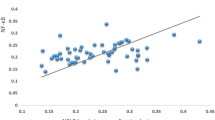Summary
This study was aimed to investigate the expressions of E-cadherin, p120ctn, β-catenin and NF-κB in ulcerative colitis (UC) tissues and the implications of their expressions in the pathogenesis of UC. The expressions of E-cadherin, p120ctn, β-catenin and NF-κB were detected by immunohistochemistry, and those of p120ctn and NF-κB by Western blotting in 23 cases of UC and 17 cases of normal colonic tissues. The relationship between the expression of E-cadherin or NF-κB and that of p120ctn was analyzed by Spearman rank correlation analysis. The results showed that in UC and normal colonic groups, the abnormal expression rate of E-cadherin, p120ctn, β-catenin, and NF-κB was 52.2% vs. 0 (P<0.05), 73.9% vs. 23.5% (P<0.05), 65.2% vs. 17.6% (P<0.05) and 78.4% vs. 23.5% (P<0.05), respectively. p120ctn expression was positively correlated with E-cadherin expression (r=0.404, P<0.05), but negatively with nuclear NF-κB expression (r= − 0.347, P<0.05). Western blotting showed that as compared with the normal controls, the p120ctn protein level was significantly decreased (P<0.05), whereas the NF-κB protein level was increased (P<0.05) in UC tissues. It was concluded that in the colonic tissues of UC patients, the expressions of E-cadherin, p120ctn and β-catenin are decreased, suggesting the mucosal barrier is impaired in UC. Moreover, NF-κB is increased and activated in the UC tissues, resulting in the inflammation in UC. p120ctn may influence the UC development through modulating intercellular adhesion and inflammatory response.
Similar content being viewed by others
References
Ordás I, Eckmann L, Talamini M, et al. Ulcerative colitis. Lancet, 2012,380(9853):1606–1619
Ford AC, Moayyedi P, Hanauer SB. Ulcerative colitis. BMJ, 2013,346:f432
Zallot C, Peyrin-Biroulet L. Deep remission in inflammatory bowel disease: looking beyond symptoms. Curr Gastroenterol Rep, 2013,15(3):315
Osterman MT. Mucosal healing in inflammatory bowel disease. J Clin Gastroenterol, 2013,47(3):212–221
Chevaux JB, Vavricka SR, Rogler G, et al. Mucosal healing with anti-TNF antibodies. Digestion, 2012,86(Suppl 1):16–22
Casellas F, Barreiro de Acosta M, Iglesias M, et al. Mucosal healing restores normal health and quality of life in patients with inflammatory bowel disease. Eur J Gastroenterol Hepatol, 2012,24(7):762–769
Gooding JM, Yap KL, Ikura M. The cadherin-catenin complex as a focal point of cell adhesion and signalling: new insights from three-dimensional structures. Bioessays, 2004,26(5):497–511
Marie PJ, Haÿ E, Modrowski D, et al. Cadherin-mediated cell-cell adhesion and signaling in the skeleton. Calcif Tissue Int, 2014,94(1):46–54
Reynolds AB, Roesel DJ, Kanner SB, et al. Transformation-specific tyrosine phosphorylation of a novel cellular protein in chicken cells expressing oncogenic variants of the avian cellular src gene. Mol Cell Biol, 1989,9(2):629–638
Ishiyama N, Lee SH, Liu S, et al. Dynamic and static interactions between p120 catenin and E-cadherin regulate the stability of cell-cell adhesion. Cell, 2010,141(1):117–128
Perez-Moreno M, Davis MA, Wong E, et al. p120-catenin mediates inflammatory responses in the skin. Cell, 2006,124(3):631–644
Karrasch T, Jobin C. NF-kappaB and the intestine: friend or foe? Inflamm Bowel Dis, 2008,14(1):114–124
Koga H, Sakisaka S, Ohishi M, et al. Expression of cyclooxygenase-2 in human hepatocellular carcinoma: relevance to tumor dedifferentiation. Hepatology, 1999,29(3):688–696
Karayiannakis AJ, Syrigos KN, Efstathiou J, et al. Expression of catenins and E-cadherin during epithelial restitution in inflammatory bowel disease. J Pathol, 1998,185(4):413–418
Shimoyama Y, Hirohashi S, Hirano S, et al. Cadherin cell-adhesion molecules in human epithelial tissues and carcinomas. Cancer Res, 1989,49(8):2128–2133
Smalley-Freed WG, Efimov A, Burnett PE, et al. p120-catenin is essential for maintenance of barrier function and intestinal homeostasis in mice. J Clin Invest, 2010,120(6):1824–1835
Neurath MF, Becker C, Barbulescu K. Role of NF-kappaB in immune and inflammatory responses in the gut. Gut, 1998,43(6):856–860
Egan LJ, Toruner M. NF-kappaB signaling: pros and cons of altering NF-kappaB as a therapeutic approach. Ann N Y Acad Sci, 2006,1072:114–122
Neurath MF, Fuss I, Schürmann G, et al. Cytokine gene transcription by NF-kappa B family members in patients with inflammatory bowel disease. Ann N Y Acad Sci, 1998,859:149–159
Singh A, Talekar M, Raikar A, et al. Macrophage-targeted delivery systems for nucleic acid therapy of inflammatory diseases. J Control Release, 2014,190:515–530
Schreiber S, Nikolaus S, Hampe J. Activation of nuclear factor kappa B in inflammatory bowel disease. Gut, 1998,42(4):477–484
Perez-Moreno M, Song W, Pasolli HA, et al. Loss of p120 catenin and links to mitotic alterations, inflammation, and skin cancer. Proc Natl Acad Sci USA, 2008,105(40):15399–15404
Davis MA, Reynolds AB. Blocked acinar development, E-cadherin reduction, and intraepithelial neoplasia upon ablation of p120-catenin in the mouse salivary gland. Dev Cell, 2006,10(1):21–31
Wang M, Li N, Li J, et al. Involvement of p120 in LPS-induced NF-kappaB activation and IL-8 production in human bronchial epithelial cells. Toxicol Lett, 2010,195(1):75–81
Egan LJ, de Lecea A, Lehrman ED, et al. Nuclear factor-kappa B activation promotes restitution of wounded intestinal epithelial monolayers. Am J Physiol Cell Physiol, 2003,285(5):C1028–C1035
Author information
Authors and Affiliations
Corresponding author
Additional information
This project was supported by a grant from the National Natural Science Foundation of China (No. 81070009).
Rights and permissions
About this article
Cite this article
Zhang, C., Liu, Lw., Sun, Wj. et al. Expressions of E-cadherin, p120ctn, β-catenin and NF-κB in ulcerative colitis. J. Huazhong Univ. Sci. Technol. [Med. Sci.] 35, 368–373 (2015). https://doi.org/10.1007/s11596-015-1439-9
Received:
Revised:
Published:
Issue Date:
DOI: https://doi.org/10.1007/s11596-015-1439-9




